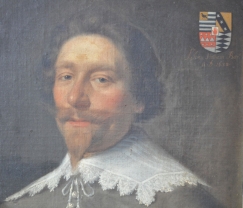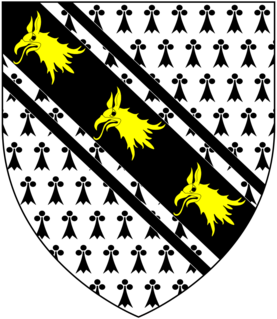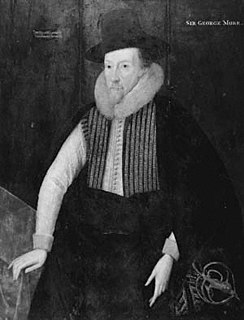Related Research Articles

Sir John Hotham, 1st Baronet of Scorborough Hall, near Driffield, Yorkshire, was an English Member of Parliament who was Governor of Hull in 1642 shortly before the start of the Civil War. He refused to allow King Charles I or any member of his entourage to enter the town, thereby depriving the king of access to the large arsenal contained within. Later in the Civil War he and his son John Hotham the younger were accused of treachery to the Parliamentarian cause, found guilty and executed on Tower Hill.

Edward Littleton, 1st Baron Lyttleton, from Munslow in Shropshire, was a Chief Justice of North Wales. He was descended from the judge and legal scholar, Thomas de Littleton. His father, also Edward, had been Chief Justice of North Wales before him.

Walter Yonge (1579–1649) of Great House in the parish of Colyton in Devon, England, was a lawyer, merchant and diarist.

Sir John Fortescue of Salden Manor, near Mursley, Buckinghamshire, was the seventh Chancellor of the Exchequer of England, serving from 1589 until 1603.
Henry Compton, 1st Baron Compton, was an English peer and Member of Parliament.
Thomas Hatcher was an English politician who sat in the House of Commons at various times between 1624 and 1659. He fought on the Parliamentary side during the English Civil War.

Sir Henry Rolle (1589–1656), of Shapwick in Somerset, was Chief Justice of the King's Bench and served as MP for Callington, Cornwall, (1614–1623–4) and for Truro, Cornwall (1625–1629).

Sir Richard Knightley of Fawsley Hall in Northamptonshire was an English Member of Parliament (MP) and leading patron of the Puritans during the reign of Elizabeth I. The Knightleys were one of the leading families of Northamptonshire.
Sir John Corbet, 1st Baronet was MP for Norfolk between 1624 and 1625 and Yarmouth between 1625 and 1626.
Richard Meredith was the Church of Ireland Bishop of Leighlin from 1589 until his death.
Job Throckmorton (Throkmorton) (1545–1601) was a puritan English religious pamphleteer and Member of Parliament during the reign of Queen Elizabeth I. Possibly with John Penry and John Udall, he authored the Martin Marprelate anonymous anti-clerical satires; scholarly consensus now makes him the main author.
Valentine Dale was an English jurist and diplomat. He served as Judge of the High Court of Admiralty from 1584 to 1589.
Sir John Parker was an English soldier and politician.
Framlingham Gawdy was an English politician who sat in the House of Commons from 1614 to 1648. He was a passive Parliamentarian during the English Civil War.

Sir William Courtenay of Powderham in Devon was a prominent member of the Devonshire gentry. He was Sheriff of Devon in 1579–80 and received the rare honour of having been three times elected MP for the prestigious county seat (Devon) in 1584, 1589 and 1601.

Sir George More was an English courtier and politician who sat in the House of Commons at various times between 1584 and 1625.
Sir Hugh Beeston was an English politician who sat in the House of Commons at various times between 1589 and 1614.
John Bennett was an English politician.
John Hammond (1542–1589) was an English civil lawyer and politician.
Sir John Wolley was Queen Elizabeth I's Latin Secretary, a member of her Privy Council, and a member of Parliament from 1571 until his death in 1596.